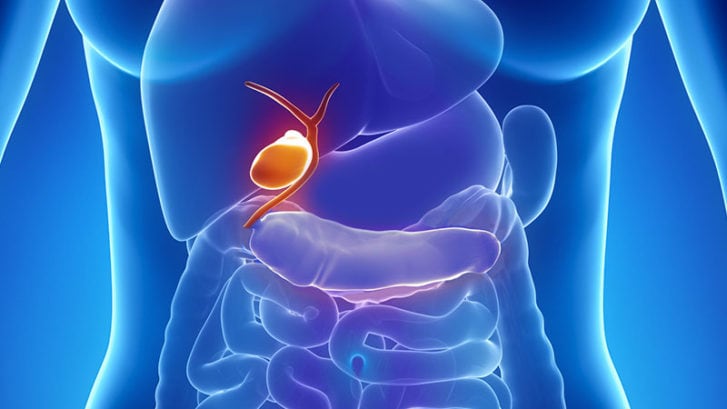Gallbladder cancer
Gallbladder cancer is cancer that begins in the gallbladder.
The Gallbladder is a small, pear-shaped organ on the right side of your abdomen, just beneath your liver. The Gallbladder stores bile, a digestive fluid produced by your liver.
Gallbladder cancer is uncommon. When gallbladder cancer is discovered at its earliest stages, the chance for a cure is very good. But most gallbladder cancers are discovered at a late stage when the prognosis is often very poor.
Gallbladder cancer is difficult to diagnose because it often causes no specific signs or symptoms. Also, the relatively hidden nature of the gallbladder makes it easier for gallbladder cancer to grow without being detected.
Causes
It’s not clear what causes gallbladder cancer.
Doctors know that gallbladder cancer forms when healthy gallbladder cells develop changes (mutations) in their DNA. These mutations cause cells to grow out of control and to continue living when other cells would normally die. The accumulating cells form a tumor that can grow beyond the gallbladder and spread to other areas of the body.
Most gallbladder cancer begins in the glandular cells that line the inner surface of the gallbladder. Gallbladder cancer that begins in this type of cell is called adenocarcinoma. This term refers to the way the cancer cells appear when examined under a microscope
Risk factors
Factors that can increase the risk of gallbladder cancer include:
- Your sex. Gallbladder cancer is more common in women.
- Your age. Your risk of gallbladder cancer increases as you age.
- Your weight. People who are obese are at higher risk for developing gallbladder cancer.
- A history of gallstones. Gallbladder cancer is most common in people who have had gallstones in the past. Still, gallbladder cancer is very rare in these people.
- Other gallbladder diseases and conditions. Other gallbladder conditions that can increase the risk of gallbladder cancer include porcelain gallbladder, choledochal cyst and chronic gallbladder infection.
Symptoms
Gallbladder cancer signs and symptoms may include:
- Abdominal pain, particularly in the upper-right portion of the abdomen
- Abdominal bloating
- Itchiness
- Fever
- Loss of appetite
- Losing weight without trying
- Nausea
- Yellowing of the skin and whites of the eyes (jaundice)
Homoeopathic Treatment
The scope of Homeopathy for cancer management varies depending on the type of cancer, stage of cancer and the general health of the patient. Following are some of the aspects of Cancer management with Homeopathy:
- One of the most distressing complaints associated with some varieties of Cancer is the agonizing pain. Conventional medicines can provide pain relief but only to a certain extent and these medicines are not without any side effects. Moreover, there is always a restriction to the dosage that can be safely administered to the patient. The advantage of administering Homeopathic medicines in such cases is that there can be effective pain control without inducing any side effects.
- Homeopathy can help in improving the general well-being and vitality of the patient.
- Conventional treatment options for cancer (chemotherapy, radiotherapy, etc) are associated with distressing side effects and homeopathy can play a definitive role to counter these side effects.
- The diagnosis of cancer often leaves the patient with a sense of depression, anxiety, and fear. The treatment may induce additional irritability, impatience and mood fluctuations. Homeopathy can influence the psyche of the patient and help him to deal with these emotions in a better way.
- Homeopathic medicines may also have a role to play in controlling the pace at which the disease increases and spread of the disease to other organs.
Homeopathic medicines can also be administered along with the allopathic medicines.

